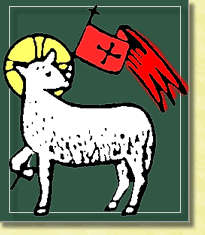A sermon I preached at Trinity School for Ministry chapel. The videoe version can be found here.
Exodus 12:21-28
Psalm 40:1-11
1 Corinthians 1:1-9
John 1:29-42
Almighty God, whose Son our Savior Jesus Christ is the light of the world: Grant that your people, illumined by your Word and Sacraments, may shine with the radiance of Christ’s glory, that he may be known, worshiped, and obeyed to the ends of the earth; through Jesus Christ our Lord, who with you and the Holy Spirit lives and reigns, one God, now and for ever. Amen.

I begin this sermon by talking about a couple of reasons why I don’t trust the liturgical season of Epiphany.
First, the season of Epiphany seems like a contradiction. The word Epiphany comes from the combination of two Greek words: epi meaning “on” and phainen meaning “to show” or “appear,” or, more literally, “shine on.” According to my Greek lexicon, in pagan writings, the word epiphaneia had to do with the visible manifestation of a hidden divinity. So it makes sense that in the liturgical year, Epiphany marks the season following the celebration of the feast of the Magi – the wise men who came from the East to bring gifts to the child Jesus – and it commemorates the first appearance of Jesus to the Gentiles.
The etymology of the word Epiphany comes from a word meaning “to shine,” and it is significant that the season of Epiphany is marked by light imagery. The Magi follow a star that leads them to Bethlehem. The Psalm from the fifth Sunday of Epiphany begins with the words “The Lord is my light and my salvation: Whom Shall I fear?” (Psalm 27:1) This morning’s Psalm is full of imagery of deliverance: “I waited patiently for the Lord; he inclined to me and heard my cry . . . He put a new song in my mouth, a song of praise to our God. Many will see and fear, and put their trust in the Lord” (Psalm 40:1, 3).
So a central theme of the Season of Epiphany has to do with the shining of the light, with images of celebration, and deliverance, of new beginnings. It is a kind of continuation of the celebration of Christmas. Yet Epiphany season takes place in the gloomiest time of the year, especially in Western Pennsylvania, but elsewhere as well. January through March. Gray day after gray day. The name for a chronic depression that affects many people during this time of the year is Seasonal Affective Disorder. The lack of light day after day leads to depression. Why would the church choose to celebrate the Good News of Jesus’ manifestation to the world during a time of year in which it is so hard to see God’s presence anywhere? It doesn’t seem to make sense.
Second, Epiphany feels like a false promise. This season after Christmas commemorates various ways in which God’s incarnation in Christ was manifested: the baptism of Jesus; Jesus’ call of his first disciples; the Sermon on the Mount; the presentation of the baby Jesus in the temple. This morning’s Gospel reading speaks of John the Baptist recognizing Jesus as the “lamb of God who takes away the sin of the world” and the calling of some of Jesus’ first disciples, including Simon Peter (John 1:29, 35-41). It’s a big party! Yet we know what is right around the corner. Epiphany is like a poor step child in the liturgical year. It marks a kind of place marker on the calendar. We need something to do before the Season of Lent, so we just extend Christmas a bit with some “feel good” stuff, “happy stories” about Jesus. And Epiphany is ephemeral. It does not even last a set number of weeks. Sometimes it’s long; sometimes, it’s short. At least for me, one of the consequences is that while I am hearing all of these wonderful stories about Jesus’ baptism and the calling of his disciples, I am looking over my shoulder. I am not going to get too excited or celebrate too much because I know Ash Wednesday is going to be here before I know it, and Lent is going to land on me like a pile of bricks.
Of course, what I just said is deliberately facetious. It reflects a misunderstanding of what is actually going on in the liturgical year. (more…)


